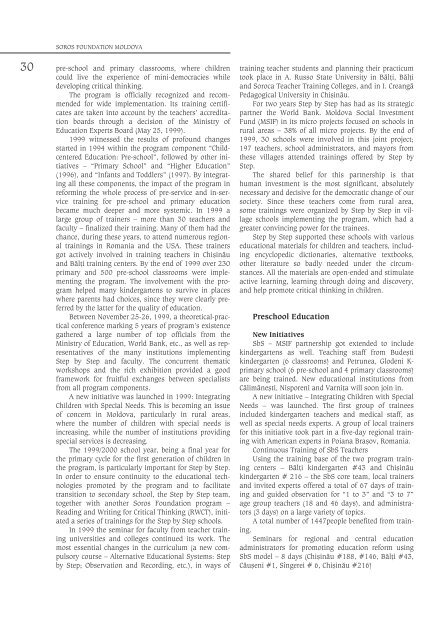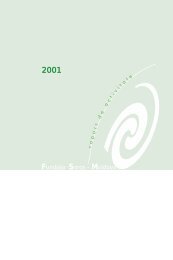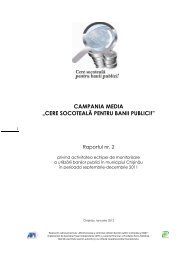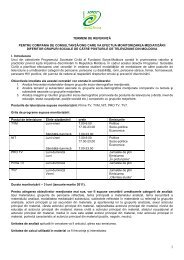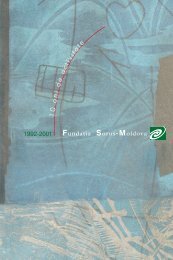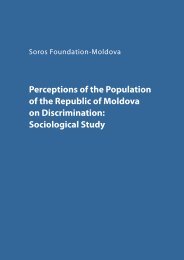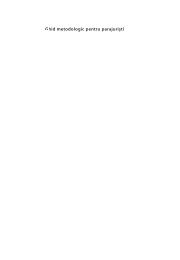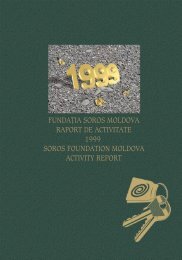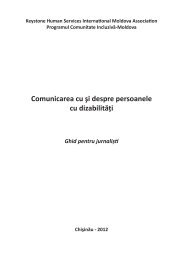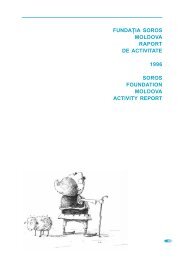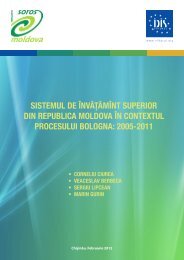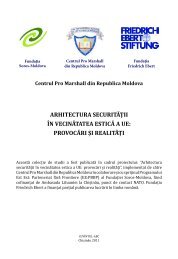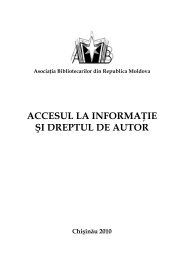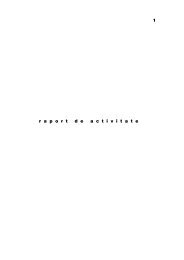Activity report for 1999(PDF) - Soros Foundation Moldova
Activity report for 1999(PDF) - Soros Foundation Moldova
Activity report for 1999(PDF) - Soros Foundation Moldova
You also want an ePaper? Increase the reach of your titles
YUMPU automatically turns print PDFs into web optimized ePapers that Google loves.
30<br />
SOROS FOUNDATION MOLDOVA<br />
pre-school and primary classrooms, where children<br />
could live the experience of mini-democracies while<br />
developing critical thinking.<br />
The program is officially recognized and recommended<br />
<strong>for</strong> wide implementation. Its training certificates<br />
are taken into account by the teachers’ accreditation<br />
boards through a decision of the Ministry of<br />
Education Experts Board (May 25, <strong>1999</strong>).<br />
<strong>1999</strong> witnessed the results of profound changes<br />
started in 1994 within the program component “Childcentered<br />
Education: Pre-school”, followed by other initiatives<br />
– “Primary School” and “Higher Education”<br />
(1996), and “Infants and Toddlers” (1997). By integrating<br />
all these components, the impact of the program in<br />
re<strong>for</strong>ming the whole process of pre-service and in-service<br />
training <strong>for</strong> pre-school and primary education<br />
became much deeper and more systemic. In <strong>1999</strong> a<br />
large group of trainers – more than 30 teachers and<br />
faculty – finalized their training. Many of them had the<br />
chance, during these years, to attend numerous regional<br />
trainings in Romania and the USA. These trainers<br />
got actively involved in training teachers in Chiøinæu<br />
and Bælfli training centers. By the end of <strong>1999</strong> over 230<br />
primary and 500 pre-school classrooms were implementing<br />
the program. The involvement with the program<br />
helped many kindergartens to survive in places<br />
where parents had choices, since they were clearly preferred<br />
by the latter <strong>for</strong> the quality of education.<br />
Between November 25-26, <strong>1999</strong>, a theoretical-practical<br />
conference marking 5 years of program’s existence<br />
gathered a large number of top officials from the<br />
Ministry of Education, World Bank, etc., as well as representatives<br />
of the many institutions implementing<br />
Step by Step and faculty. The concurrent thematic<br />
workshops and the rich exhibition provided a good<br />
framework <strong>for</strong> fruitful exchanges between specialists<br />
from all program components.<br />
A new initiative was launched in <strong>1999</strong>: Integrating<br />
Children with Special Needs. This is becoming an issue<br />
of concern in <strong>Moldova</strong>, particularly in rural areas,<br />
where the number of children with special needs is<br />
increasing, while the number of institutions providing<br />
special services is decreasing.<br />
The <strong>1999</strong>/2000 school year, being a final year <strong>for</strong><br />
the primary cycle <strong>for</strong> the first generation of children in<br />
the program, is particularly important <strong>for</strong> Step by Step.<br />
In order to ensure continuity to the educational technologies<br />
promoted by the program and to facilitate<br />
transition to secondary school, the Step by Step team,<br />
together with another <strong>Soros</strong> <strong>Foundation</strong> program –<br />
Reading and Writing <strong>for</strong> Critical Thinking (RWCT), initiated<br />
a series of trainings <strong>for</strong> the Step by Step schools.<br />
In <strong>1999</strong> the seminar <strong>for</strong> faculty from teacher training<br />
universities and colleges continued its work. The<br />
most essential changes in the curriculum (a new compulsory<br />
course – Alternative Educational Systems: Step<br />
by Step; Observation and Recording, etc.), in ways of<br />
training teacher students and planning their practicum<br />
took place in A. Russo State University in Bælfli, Bælfli<br />
and Soroca Teacher Training Colleges, and in I. Creangæ<br />
Pedagogical University in Chiøinæu.<br />
For two years Step by Step has had as its strategic<br />
partner the World Bank. <strong>Moldova</strong> Social Investment<br />
Fund (MSIF) in its micro projects focused on schools in<br />
rural areas – 38% of all micro projects. By the end of<br />
<strong>1999</strong>, 30 schools were involved in this joint project;<br />
197 teachers, school administrators, and mayors from<br />
these villages attended trainings offered by Step by<br />
Step.<br />
The shared belief <strong>for</strong> this partnership is that<br />
human investment is the most significant, absolutely<br />
necessary and decisive <strong>for</strong> the democratic change of our<br />
society. Since these teachers come from rural area,<br />
some trainings were organized by Step by Step in village<br />
schools implementing the program, which had a<br />
greater convincing power <strong>for</strong> the trainees.<br />
Step by Step supported these schools with various<br />
educational materials <strong>for</strong> children and teachers, including<br />
encyclopedic dictionaries, alternative textbooks,<br />
other literature so badly needed under the circumstances.<br />
All the materials are open-ended and stimulate<br />
active learning, learning through doing and discovery,<br />
and help promote critical thinking in children.<br />
Preschool Education<br />
New Initiatives<br />
SbS – MSIF partnership got extended to include<br />
kindergartens as well. Teaching staff from Budeøti<br />
kindergarten (6 classrooms) and Petrunea, Glodeni Kprimary<br />
school (6 pre-school and 4 primary classrooms)<br />
are being trained. New educational institutions from<br />
Cælimæneøti, Nisporeni and Varnifla will soon join in.<br />
A new initiative – Integrating Children with Special<br />
Needs – was launched. The first group of trainees<br />
included kindergarten teachers and medical staff, as<br />
well as special needs experts. A group of local trainers<br />
<strong>for</strong> this initiative took part in a five-day regional training<br />
with American experts in Poiana Braøov, Romania.<br />
Continuous Training of SbS Teachers<br />
Using the training base of the two program training<br />
centers – Bælfli kindergarten #43 and Chiøinæu<br />
kindergarten # 216 – the SbS core team, local trainers<br />
and invited experts offered a total of 67 days of training<br />
and guided observation <strong>for</strong> “1 to 3” and “3 to 7”<br />
age group teachers (18 and 46 days), and administrators<br />
(3 days) on a large variety of topics.<br />
A total number of 1447people benefited from training.<br />
Seminars <strong>for</strong> regional and central education<br />
administrators <strong>for</strong> promoting education re<strong>for</strong>m using<br />
SbS model – 8 days (Chiøinæu #188, #146, Bælfli #43,<br />
Cæuøeni #1, Sîngerei # 6, Chiøinæu #216)


